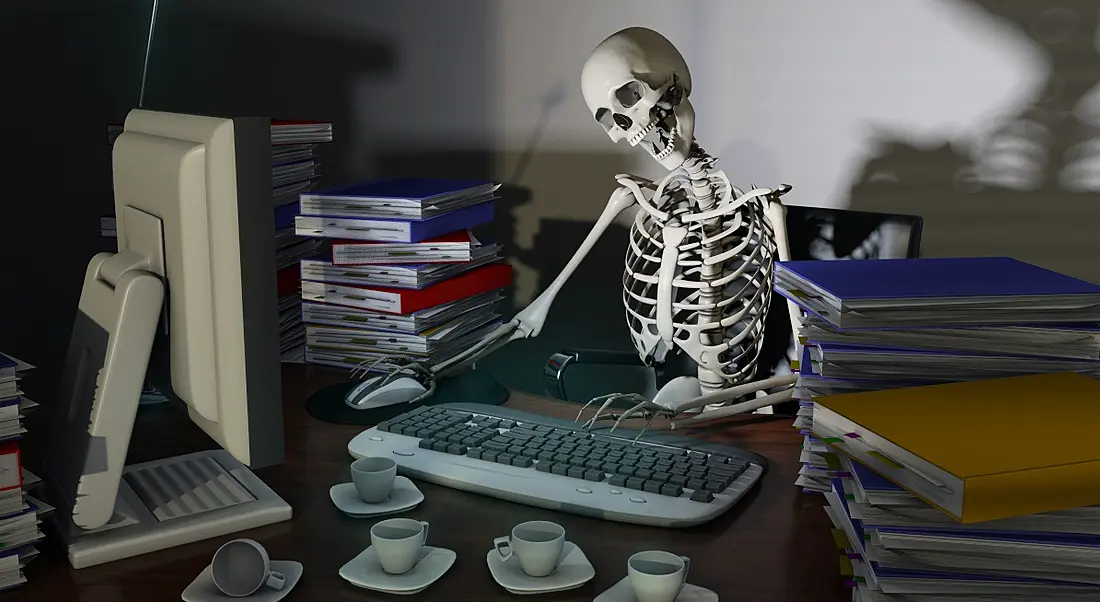As noted by the World Health Organization, too much work can have a damaging effect on physical, emotional and mental health.
In April, South Korean electronics manufacturer Samsung revealed in light of a difficult financial year executives would be expected to work a six-day week. The company said the policy was issued to inject a sense of urgency and light a fire under employees.
But for Yseult Freeney, the professor of organisational psychology at Dublin City University (DCU) Business School, employees who constantly operate in crisis mode become burnt out and cynical about their work.
Passionate about her research, which involves finding ways to make people’s working lives healthy and fulfilling, Freeney noted the untenable nature of working models that don’t allow for an adequate respite period. “Recovery from work, in the form of microbreaks, exercise, weekends and holidays, are critical for sustaining our engagement with work,” explained Freeney.
She said that it is an issue when organisations and employees watch the clock, using it as a means to show progress, engagement and success.
“When we focus on the clock, we fuel ‘presenteeism’ or ‘face-time’, which is popularly known as feeling compelled to be seen at work. Higher levels of presenteeism are far more prevalent in jobs with high workloads, pressing deadlines and limited backup support, but there is no evidence that it equates to better performance.”
Killing critical thought
According to Freeney, when denied the necessary opportunities to relax and decompress, overworked employees are likely to make mistakes and become irritable, as the physical and mental exhaustion takes a toll.
This, Freeney says, “gives rise to more conflict at work and the strain they experience spills over into their home life, disrupting relationships with family and friends”.
This can then impact on people’s physical health. “Dealing with overwork and chronic stress can have a long-lasting impact on a person’s health and wellbeing.
“Research published by the World Health Organization (WHO) found that those working 55 or more hours a week had a 35pc higher risk for stroke and a 17pc higher risk of dying from ischemic heart disease, when compared to people who worked 35 to 40 hours a week.
“While overwork is a problem around the globe, the Japanese perhaps best capture this with the concept of ‘karoshi’, which means death from overworking,” said Freeney.
For knowledge workers, she explained, cognitive fatigue is an acute problem for those who work long hours. The exhaustion from endless digital communication and task management can deplete cognitive resources, which are crucial for key decision-making and innovation.
“This cognitive overload can reduce the ability to think creatively, as the brain becomes too tired to generate new ideas or make novel connections. Creativity, in particular, requires the ability to think flexibly and approach problems from different angles. Overwork can lead to mental rigidity, where the motivation to think outside the box is diminished.”
She cited Parkinson’s law, which dictates that work will always expand to fill the time you allow it. This means that employees are often less productive when they know they have significantly more time to fill.
Freeney is of the opinion that those who have a tighter schedule can better manage the boundaries between work and home, becoming more productive through ruthless prioritisation, sharper focus and downtime.
Finding a way forward
It is not uncommon for employees to put pressure on themselves to be seen as active and hard-working; thus, feeling compelled to work longer hours.
“Employees who put in extra hours might be perceived as more dedicated or ambitious, potentially leading to promotions and career growth opportunities. Again, simply being visible in an organisation can be perceived as important for career progression. We know that ‘ideal worker norms’ mean that people do feel compelled to buy into the overwork culture and often feel powerless to refuse.”
Many companies have trialled the four-day work week, with varying levels of success, but as noted by Freeney, the advantages can include increased productivity, enhanced wellbeing and stronger work engagement.
“Employees involved in a research trial on the shorter working week reported a significant increase in physical and mental health, life and relationship satisfaction and work-family balance.
“Overall, the benefits for employees seem clear, there is emerging evidence that productivity is boosted and offering shorter working weeks is a potential source of competitive advantage when it comes to attracting and retaining talent.”
Don’t miss out on the knowledge you need to succeed. Sign up for the Daily Brief, Silicon Republic’s digest of need-to-know sci-tech news.




